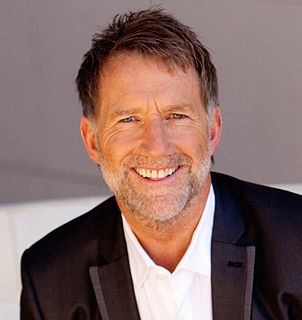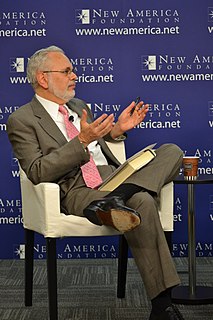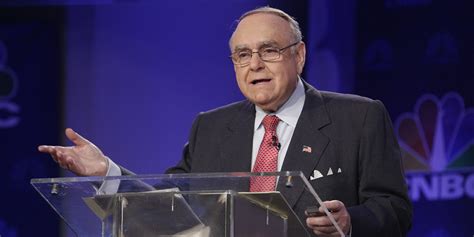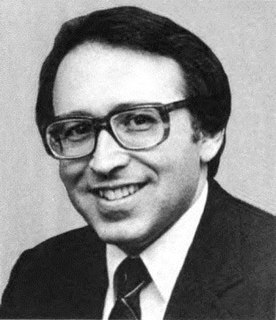Top 1200 Market Leaders Quotes & Sayings - Page 17
Explore popular Market Leaders quotes.
Last updated on October 6, 2024.
One of the great things about design is that it's truly international. No one in the design industry would say, "This country is mine," or "I will make it look this way because it's for an American market and that way for a Chinese market." If you look at all of the Apple products, they are the same everywhere . . . I mean, I can't deny that I love traveling. It's a very healthy thing to be able to appreciate other cultures - or at least witness them firsthand. And all of that goes into helping someone be a good designer, because it's an international business.
If you let interest rates be freed, be set by the free market, they would rise dramatically. There would be a lot of broken furniture on Wall Street. It needs to be broken. The back of the speculative bubble would be broken and we could slowly heal the financial system. That's what I think we need to do but it's never going to happen because there's trillions of asset values dependent on the Fed continuing to suppress, repress interest rates and shovel $85 billion a month of liquidity into the market.
When you coach and teach leadership, most people think about them. It's like you're the leader and how do you influence them. Clearly, leaders do take their followers, their flock, their enterprise, their business - whatever - hopefully to a better place. But I think the foundation of what makes really great leaders is they lead themselves, and they're conscious about knowing themselves and coaching and leading themselves in a very profound way. The simplest of us talk to ourselves. The question is, "Do we really lead ourselves?"
The essential contradiction at the heart of America's problems: if we were a democracy and if we truly enjoyed free speech, we would be able to study and speak about the CIA. We would confront our institutionalized racism and sadism. But we can't, and so our agency's history remains unknown, which in turn means we have no idea who we are, as individuals or as a nation. We imagine ourselves to be things we are not. Our leaders know bits and pieces of the truth, but they cease being leaders once they begin to talk about the truly evil things the CIA is doing.
Experience conclusively shows that index-fund buyers are likely to obtain results exceeding those of the typical fund manager, whose large advisory fees and substantial portfolio turnover tend to reduce investment yields. Many people will find the guarantee of playing the stock-market game at par every round a very attractive one. The index fund is a sensible, serviceable method for obtaining the market's rate of return with absolutely no effort and minimal expense.
What is the free market? Well, the free market, [we're told] is really a terrible, inhuman kind of arrangement, because it treats people like commodities. But how does the government treat people? Like garbage-worse than garbage. Not like commodities, but like nothing. We libertarians understand that we are not humane, we are not compassionate. It's the leftists and the liberals, they're the ones who are human and compassionate, but you'd better not get in their way.
There are times when a market such as housing, transportation or the stock or mortgage market keep rising and people with capital want to join in this growth. Soon the markets become overheated, partly because of the abundance of investment money and speculation. This is when the government should raise interest rates and increase the cost of borrowed money. Governments are shy about doing this because it could cause the very recession. Yet this is the best time to do this so that the inevitable recession never reaches the magnitude of the recent Great Recession.
I respect not his labors, his farm where everything has its price, who would carry the landscape, who would carry his God, to market, if he could get anything for him; who goes to market for his god as it is; on whose farm nothing grows free, whose fields bear no crops, whose meadows no flowers, whose trees no fruits, but dollars.
I call this the Fundamental Problem of Political Economy. How do we limit the power that idiots have over us? ... [Milton] Friedmans insight is that a market limits the power that others have over us; conversely, limiting the power that others have over us allows us to have markets. Friedman argued that no matter how wise the officials of government may be, market competition does a better job of protecting us from idiots.
One of the most important analytic tools when assessing an investment is an intellectually advantaged disparate view. This includes knowing more and perceiving the situation better than others do. It is also critical to have a keen understanding of what the market expectations for any investment truly are. Thus, the process by which a disparate perception, when correct, becomes consensus should lead to meaningful profit. Understanding market expectation is at least as important as, and often different from fundamental knowledge.
Agile leaders encourage their teams to adjust and experiment constantly. In today's age of oversharing, the best leaders also have to be more open and accessible. To be effective, you also have to be aware of how others perceive you and cop to your flaws every now and then. One of the lesson to successful leadership may be quite challenging but very important. Expose yourself. Allow yourself to be vulnerable - less super and more human. These "Leadership 3.0" practices, as I call them, are critical to being an effective manager when you're getting started in today's world.
In short, what the living wage is really about is not living standards, or even economics, but morality. Its advocates are basically opposed to the idea that wages are a market price-determined by supply and demand, the same as the price of apples or coal. And it is for that reason, rather than the practical details, that the broader political movement of which the demand for a living wage is the leading edge is ultimately doomed to failure: For the amorality of the market economy is part of its essence, and cannot be legislated away.
Increasingly, our leaders must deal with dangers that threaten the entire world, where an understanding of those dangers and the possible solutions depends on a good grasp of science. The ozone layer, the greenhouse effect, acid rain, questions of diet and heredity. All require scientific literacy. Can Americans choose the proper leaders and support the proper programs if they themselves are scientifically illiterate? The whole premise of democracy is that it is safe to leave important questions to the court of public opinion - but is it safe to leave them to the court of public ignorance?
A leader always has one major message, and this weaves into everything he or she does. It remains the primary focus. A leader is to some degree a prophet, a person with a message. Great leader [sic] see things that others don’t. They preach it until others can see it as well. Their message supports the mission. A leader is a preacher, a person who communicates the fire of the mission. Not all preachers are leaders, but all great leaders will be preachers of one sort or another.
"No one is doing what we're doing." This is a bummer of a lie because there are only two logical conclusions. First, no one else is doing this because there is no market for it. Second, the entrepreneur is so clueless that he can't even use Google to figure out he has competition. Suffice it to say that the lack of a market and cluelessness is not conducive to securing an investment. As a rule of thumb, if you have a good idea, five companies are going the same thing. If you have a great idea, fifteen companies are doing the same thing.
I ask you and all the leaders of the world: Would you act differently, would you keep silent and do nothing if you were in our place? Would you not resist if you were allowed no rights in your own country because the color of your skin is different to that of the rulers, and if you were punished for even asking for equality? I appeal to you, and through you to all the countries of the world, to do everything you can to stop the coming tragedy. I appeal to you to save the lives of our leaders, to empty the prisons of all those who should never have been there.
Warren Buffett is right when he says you should invest as if the market is going to be closed for the next five years. The fundamental principles of value investing, if they make sense to you, can allow you to survive and prosper when everyone else is rudderless. We have a proven map with which to navigate. It sounds kind of crazy, but in times of turmoil in the market. I’ve felt a sort of serenity in knowing that if I’ve checked and rechecked my work, one plus one still equals two regardless of where a stock trades right after I buy it.
The great virtue of free enterprise is that it forces existing businesses to meet the test of the market continuously, to produce products that meet consumer demands at lowest cost, or else be driven from the market. It is a profit-and-loss system. Naturally, existing businesses generally prefer to keep out competitors in other ways. That is why the business community, despite its rhetoric, has so often been a major enemy of truly free enterprise.
For they (capitalists) hold as their chief heresy, in a coarser form, the fundamental falsehood that things are not made to be used but made to be sold. All the collapse of their commercial system in their own time has been due to that fallacy of forcing things on a market where there was no market; of continually increasing the power of supply without increasing the power of demand; of briefly, of always considering the man who sells the potato and never considering the man who eats it.
The great thing about the Internet is - our show is totally modular. Every piece can be popped in and out. They're relatively short pieces. They're not long. And we can say, "here' s one way to market it. Take these pieces out of the show and put them on the Internet." And we're doing dirtier cuts and put those on the Internet. It's a real great way to market the show. This is finally the year a show like this can happen.
One of my favorite patterns is the tendency for the markets to move from relative lows to relative highs and vice versa every two to four days. This pattern is a function of human behavior. It takes several days of a market rallying before it looks really good. That’s when everyone wants to buy it, and that’s the time when the professionals, like myself, are selling. Conversely, when the market has been down for a few days, and everyone is bearish, that’s the time I like to be buying.
The great multinationals are unwilling to face the moral and economic contradictions of their own behavior - producing in low-wage dictatorships and selling to high-wage democracies. Indeed, the striking quality about global enterprises is how easily free-market capitalism puts aside its supposed values in order to do business. The conditions of human freedom do not matter to them so long as the market demand is robust. The absence of freedom, if anything, lends order and efficiency to their operations.
If you go back to Adam Smith, you find the idea that markets and market forces operate as an invisible hand. This is the traditional laissez-faire market idea. But today, when economics is increasingly defined as the science of incentive, it becomes clear that the use of incentives involves quite active intervention, either by an economist or a policy maker, in using financial inducements to motivate behavior. In fact, so much though that we now almost take for granted that incentives are central to the subject of economics.
There is a bit of a problem with the match between derivative securities markets and the primary markets. We have long ago instituted principles, essentially high margin requirements, to prevent certain instabilities in the stock market, and I think they're basically correct. The trouble is that there's a linkage, let's say, between something like the stock market and the index futures markets, and the fact that the margin requirements are very different, for example, played some role in the October '87 crash.
We, the Black masses, don't want these leaders who seek our support coming to us representing a certain political party. They must come to us today as Black Leaders representing the welfare of Black people. We won't follow any leader today who comes on the basis of political party. Both parties (Democrat and Republican) are controlled by the same people who have abused our rights, and who have deceived us with false promises every time an election rolls around.
Politics is different than movies. Politics are controlled by leaders. Leaders of every country have different interests. And they try to explain to their people why they should take one side or the other side. But in the movie its doing the opposite. It allows you to have a Universal Experience. You don't watch it as politics but as a movie. You don't have different reactions all over. It's so universal a language. It's not a political language serving a political agenda. The language of cinema is a world language. With the Hollywood movie, it brings about the same reaction wherever it goes.
The way to improve productivity is not to bring in experts to talk about inputs - seed, equipment and materials, pesticides or water supply. The way to start is to provide an assured market, a fair price, and a system through which rural producers can market their produce which is reasonably efficient and can transfer to them the maximum share of the consumers' money. If such a structure is erected, the producers will then seek the inputs and materials they need to increase their production and productivity.
Rip Van Winkle would be the ideal stock market investor: Rip could invest in the market before his nap and when he woke up 20 years later, he'd be happy. He would have been asleep through all the ups and downs in between. But few investors resemble Mr. Van Winkle. The more often an investor counts his money - or looks at the value of his mutual funds in the newspaper - the lower his risk tolerance.
As Elder George F. Richards, President of the Council of the Twelve, said in a conference address in April 1947, 'when we say anything bad about the leaders of the Church, whether true or false, we tend to impair their influence and their usefulness and are thus working against the Lord and his cause.' ... The Holy Ghost will not guide or confirm criticism of the Lord's anointed, or of Church leaders, local or general. This reality should be part of the spiritual evaluation that LDS readers and viewers apply to those things written about our history and those who made it.
I think our responsibility as political leaders today, is to push our economic leaders to change their investment behavior, to decide new things, and to help workers to change their jobs. And I think the mistake that Donald Trump decided to make is exactly the mistake we made in France and in Europe. Which was to resist to the change in order to protect the old jobs. What we have to protect is people, not jobs. If you want to protect people, you retrain them.
Many politicians and pundits claim that the credit crunch and high mortgage foreclosure rate is an example of market failure and want government to step in to bail out creditors and borrowers at the expense of taxpayers who prudently managed their affairs. These financial problems are not market failures but government failure. ... The credit crunch and foreclosure problems are failures of government policy.
Having observed his market calls real time over the years, I can say that Jason Perl's application of the DeMark Indicators distinguishes his work from industry peers when it comes to market timing. This book demonstrates how traders can benefit from his insight, using the studies to identify the exhaustion of established trends or the onset of new ones. Whether you're fundamentally or technically inclined, Perl's DeMark Indicators is an invaluable trading resource.
Let’s begin with capitalism, a word that has gone largely out of fashion. The approved reference now is to the market system. This shift minimizes - indeed, deletes - the role of wealth in the economic and social system. And it sheds the adverse connotation going back to Marx. Instead of the owners of capital or their attendants in control, we have the admirably impersonal role of market forces. It would be hard to think of a change in terminology more in the interest of those to whom money accords power. They have now a functional anonymity.
Think about the difference between how your local gas station and congressman respond to a spike in oil prices. One has the price placard outside changed to reflect the reality of the market within hours. The other sends out a press release, tries to organize a hearing, and at the end of amount accomplishes nothing. Meanwhile, the gas station has already made at least thirty additional adjustments to the realities of the market while your politico fails to get anything more than easy media.
If we somehow put a value on species extinction and factor that into our costs that bottom line would look very different. IF we put any resource depletion into costs our bottom line would change. So what we have is a dishonest market that does not take into account all the costs when it establishes its prices. We need an honest marketplace before we can let the market work for sustainability rather than against it as it works today.
Berkshire's whole record has been achieved without paying one ounce of attention to the efficient market theory in its hard form. And not one ounce of attention to the descendants of that idea, which came out of academic economics and went into corporate finance and morphed into such obscenities as the capital asset pricing model, which we also paid no attention to. I think you'd have to believe in the tooth fairy to believe that you could easily outperform the market by seven-percentage points per annum just by investing in high volatility stocks.
What really worries me is that those who are in positions of power are not really affected by what we are writing. In the moral dialogue you want to start, you really want to involve the leaders. People ask me: "Why were you so bold as to publish A Man of the People? How did you think the Government was going to take it? You didn't know there was going to be a coup?" I said rather flippantly that nobody was going to read it anyway, so I wasn't likely to be fired from my official position. It's a distressing thought that we cannot engage our leaders in the kind of moral debate we need.
The business plan should address: "How will I get customers? How will I market the product or service? Who will I target?" The principles of a business plan are pretty much the same. But after page one to two, everything is unpredictable, because costs or competition will change and you don't know how things will be received by the market. You have to be able to continually adapt. Companies that fail to adapt will die. Others are brilliant at adapting.
The idea that a bell rings to signal when investors should get into or out of the stock market is simply not credible. After nearly fifty years in this business, I do not know of anybody who has done it successfully and consistently. I don't even know anybody who knows anybody who has done it successfully and consistently. Yet market timing appears to be increasingly embraced by mutual fund investors and the professional managers of fund portfolios alike.
The NSF study projected a shortfall of 675,000 scientists and engineers without considering the future demand for such individuals in the marketplace. It simply observed a decline in the number of 22-year-olds and projected that this demographic trend would result in a huge shortfall. This could be termed the supply-side theory of labor market analysis. But making labor market projections without considering the demand side of the equation doesn't pass the laugh test with experts in the field.
How have people come to be taken in by The Phenomenon of Man? We must not underestimate the size of the market for works of this kind [pseudoscience/'woo'], for philosophy-fiction. Just as compulsory primary education created a market catered for by cheap dailies and weeklies, so the spread of secondary and latterly tertiary education has created a large population of people, often with well-developed literary and scholarly tastes, who have been educated far beyond their capacity to undertake analytical thought.
I think leaders lead themselves, but leaders have ideas and maybe they're visionary ideas. Probably today, people would say Steve Jobs was a visionary because he invented this little gadget, the cell phone. But he didn't invent cell phones, and he didn't design the cell phone. He just took a couple of ideas and put them together, and no one else put those same ideas together as successfully as he did. But he had something that he was trying to do that intrigued him, and he could do it very well.
It's not enough, is it? Just to follow; just to have faith in someone bigger and smarter and better informed. That's how we're built, that's how every Partial is wired - to follow orders and trust in our leaders - but it's not enough. It never has been. We've followed our leaders, and sometimes they win and sometimes they lose; we do what they say and we play our part. But this is our decision. Our mission. And when we're done, it will be our victory, or our defeat. I don't want to fail, but if I do, I want to be able to look back and say, 'I did that. I failed. That was all me.


























































